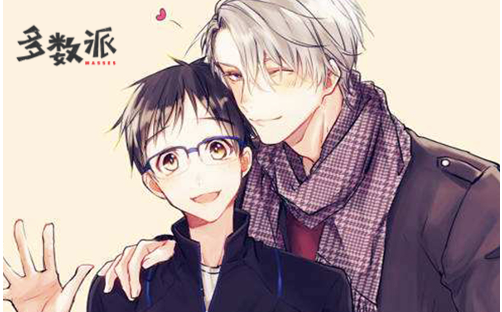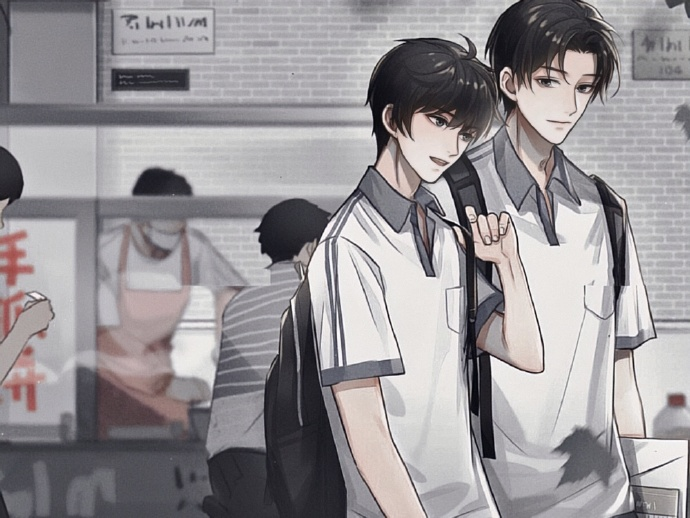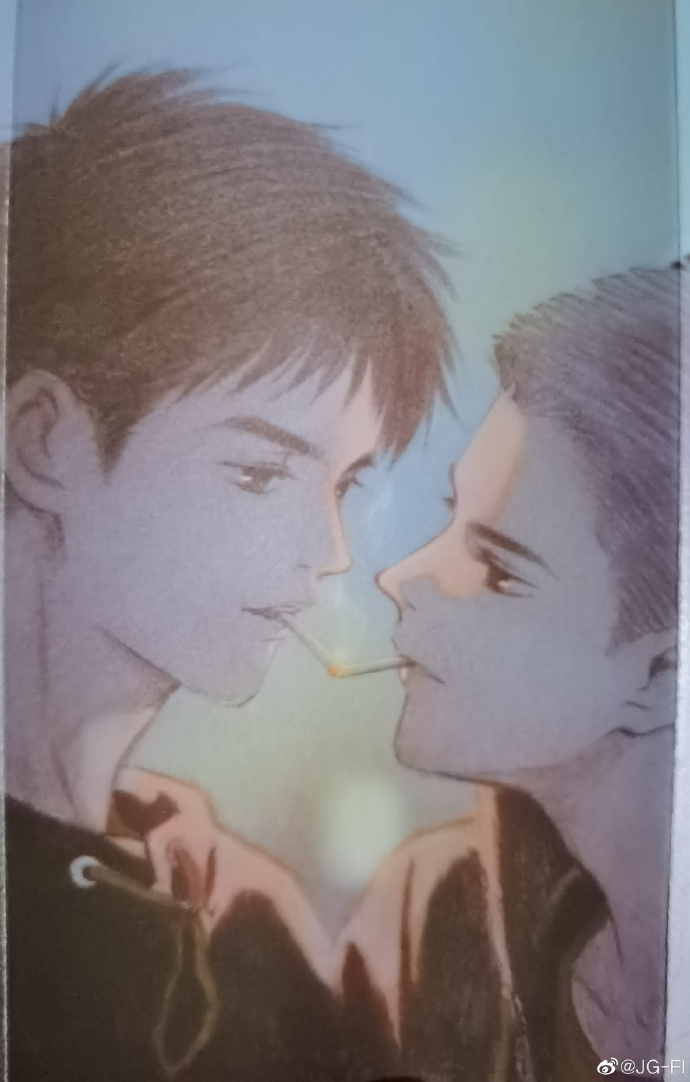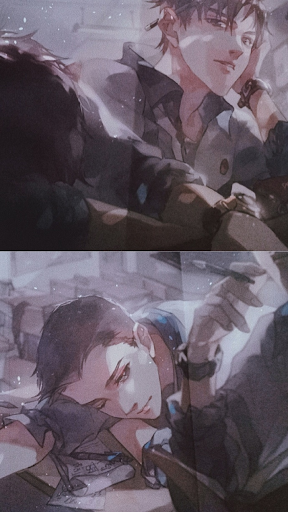Gender|Danmei’s Love Writing: Diluted and Covered Class Narratives

Text|Autistic A Liang
Danmei, as a genre novel describing male homosexual erotic stories, has developed into a prosperous cultural landscape in contemporary Chinese popular culture. From original Tanmei novels to radio dramas, animations, comics and TV/Internet dramas based on them, they have attracted a large number of readers and audiences. This year, a series of Dangai dramas have been officially announced to start filming, such as "Hao Yi Xing" adapted from "The Erha and His White Cat Shizun", "The End of the World" and "The End of the World" adapted from Priest's novel of the same name Slaying the Wolf is expected to be released in 2021. Therefore, this year is even dubbed "Dangai 101" by netizens as the year of internal entertainment Dangai.
Whether examining Tanmei novels or their derivative cultural products, past scholars’ research has mostly focused on discussing how Tanmei, as a female-dominated subculture, presents and writes about the desires and anxieties of Chinese women (see Feng Jin, 2009; Yang Ling & Xu Yanrui, 2017), or discuss how fan communities can resist or negotiate with the dominant public power in the name of the so-called "socialist brotherhood" in the specific cultural landscape of Tanmei (see Hu & Wang, 2020). But in the foregoing discussion, class writing in danmei texts is often ignored. Although when discussing women's imagination of men's same-sex love stories, the key words are often inseparable from "sex/gender and sexual desire". But gender and sexuality do not exist in isolation, but interweave and overlap with other categories, including race, class, religion, disability, and even appearance. Therefore, we try to analyze two selected specific popular danbi texts to discuss how class perspectives and class divisions are obscured in danmei love stories.
Jinjiang Literature City, referred to as Jinjiang, was formally established in August 2003 and has become the largest and most important site for Tanmei writing and reading in China. The original texts of popular summer-limited Dangai dramas in recent years, such as "Soul Soul" (adapted from Priest's novel of the same name) and "Chen Qingling" (adapted from Mo Xiang Tong Shou's "The Master of the Demon Dao"), without exception, all come from Since Jinjiang. The two danmei works selected in this article, Musuli's "So-and-so" (serialized from August to December 2019) and Wu Zhe's "Saying the Wild" (serialized from October 2016 to April 2017) are respectively located in Jinjiang Danmei works points ranking 3rd and 4th on the list. As of January 2021 when this article was written, the points of the two works both exceeded 20 billion. At the same time, both Musuli and Wu Zhe are super authors who have signed contracts with Jinjiang and have over 100 billion points. According to the scoring algorithm of works published by Jinjiang, there are two main influencing factors for its reference. The first category is directly related to the popularity of the work, including the number of clicks on the average number of words, the number of readers' ratings and comments, and the number of collections of works and authors. etc.; the second category is related to the management of the website platform, including editorial recommendations, violation of platform regulations such as soft/hard pornographic yellow cards and red card deductions, whether the work is fully authorized and whether the author is a platform (long-term) contract author. From this, it can be found that the points ranking of Jinjiang Danmei works not only reflects the popularity of a certain work, but also is the result of selection and management by website editors, and can also reflect the overall characteristics and ecology of Jinjiang Danmei works.
The following two works will be discussed in detail in this article, respectively presenting the typical and atypical narrative strategies of Tanmei stories about class and class division. However, whether it is the typical cute rich young master and cold-faced poor boy in "So-and-so", or the two strong CPs who "break away from" the traditional family and become self-reliant in the atypical "Saying the Wild", both of them start with "love". As the highest power discourse, it forcibly downplays and conceals the explicit or implicit class divisions in the story.
"So-and-so": the classic CP of the rich young master x the poor boy
As a campus novel, "So-and-so" portrays the characters and relationships between the attacker and the victim, which are very typical, and are also common in many other BL novels. One of the protagonists of the story, Sheng Wang, was born in a relatively wealthy middle-class family. Although his mother died when he was eight years old, he lived a comfortable life with his business father. Sheng Wang lives a wealthy life and is smart enough to maintain top grades even if he transfers from a high school in other provinces to the science intensive class of a key high school in Jiangsu. At the same time, he has a well-behaved and lovable personality, with a slightly talkative personality setting, which makes it hard not to like this "lazy young master who thinks he is very noble" (from the author Musuli's copywriting description).
Correspondingly, the other protagonist of the story, Jiang Tian, lived in an old house because his parents divorced since he was a child, and he was able to barely survive by relying on the care of his neighbors. Although he was picked up by his mother later, his financial conditions were still not well off. When he was studying in the attached middle school, Jiang Tian still needed to sort out materials in the teaching auxiliary center to earn living allowances. However, the theme of the novel only revolves around the gradual accumulation of feelings between Jiang Tian and Sheng Wang in campus study and life. The obvious class differences between the two are only placed in the background, and they are not further explored in the text. Expand. For example, in the novel, Shengwang will use the PSP game console, as well as many electronic products including new mobile phones, laptop computers, and headphones. In contrast, Jiang Tian, who was in high school, was a little "stretched". He always wore white wireless earphones, sat on the bay window to brush questions or played with his mobile phone with his head down.

In the text of the article "So-and-so", French sociologist Bourdieu said that the difference in taste (taste) and distinction (distinction) caused by the difference in economic capital (economic capital) is deliberately downplayed and hidden. living in the imagination. A notable example can be seen from the specific description of the images of Sheng Wang and Jiang Tian in the text, such downplaying and concealment. Whether it is Sheng Wang or Jiang Tian, the typical images of the two in the novel are highly homogeneous, both in white T-shirts or loose school uniforms over white T-shirts. For example, when Sheng Wang met Jiang Tian for the first time: "His arms covered most of his face, and he could only see the line of his mandible from the gap. The white round-neck T-shirt covered the outline of his shoulders and back." , Gently rising and falling with breathing."; Class A high school students saw Jiang Tian at the weekend gathering: "They followed the prestige and saw a tall boy standing by the subway entrance across the street, wearing the simplest white T-shirt T-shirts, constantly attracting the attention of passers-by."; He Shengwang was forced to separate from Jiang Tian, when he missed him, "Jiang Tian was wearing a loose T-shirt, blue and white school uniform with the front open, sleeves rolled up to the elbows, bent Sitting on the bay window with legs, stuffed with white wireless earphones to brush questions."
Similarly, the white T-shirt is still the most frequent description of Sheng Wang's clothing in the novel: "Sheng Wang stood there with his coat on, his large school uniform wrapped outside the white T-shirt, and the rolled up sleeves were stacked in empty folds. , showing the unique tallness and thinness of young people when they are out of joints."; Sheng Wang and Jiang Tian reunited in the morning, when he was bumped by Jiang Tian's colleague, "Who knew that when I opened the door, I saw a young handsome guy in loose white clothes. T-shirt and gray sweatpants staring at him in bewilderment."
It is not difficult to find that the author's imagination of the "simple and pure" high school youth feeling and youth love always revolves around the metaphor of the white T-shirt. After joining a top consulting company, Sheng Wang has been honed to become a standard workplace manager even though he roams around in different social situations every day. But when he reunited with Jiang Tian, he regained his sense of youth and became the "Wangzi" in a white T-shirt again. Even though Jiang Tian and Sheng Wang were separated for six years, they could still confirm their passionate love for each other immediately after they met again. This may be as the French philosopher Alain Badiou declared in "Love's Multiplayer", "A true love is a persistent victory, constantly transcending the obstacles caused by space, time, and the world." ". However, in the writing of love presented in "So-and-so", class differences and divisions are not, or are not only overcome by the power of love, but are diluted, obscured and banned in the romanticized imagination.
"Saying Wild": A love story for ordinary people?
In the discussion of the domestic Tanmei community, there is such a saying, "Most of Wu Zhe's writings are poor." The background of this kind of cognition is compared to the "per capita" domineering presidents, political and business celebrities, or movie kings and stars that often appear in original BL novels. The reason why Wu Zhe's "Saving the Wild" is marked as "atypical" is also because the two protagonists in this story, Gu Fei and Jiang Cheng, are just ordinary young people in a small town who need to be self-reliant and often worry about money and livelihood .

Both Gu Fei and Jiang Cheng lived outside the paradigm of the modern family. Gu Fei's father was often domestically violent and drowned due to alcoholism in the early years, while his mother was not involved in accidents, was often overwhelmed by love, and did not take on the responsibility of raising the family. My younger sister, Gu Miao, suffers from severe autism due to the trauma of domestic violence in her childhood. The main income of this "family" is maintained by Gu Fei's extra money from running the canteen and taking pictures. On the other hand, Jiang Cheng was sent up by his biological parents when he was born, and because of long-term estrangement and conflicts, he was resigned by his adoptive parents. So he came to the small town where his biological father Li Baoguo was, only to find that his biological father was drinking, gambling, and domestic violence. So Jiang Cheng chose to rent a place outside to support himself.
Compared with the campus love romance of "So-and-so", the story presented in "Saying the Wild" seems to be more "real". "Saving the Wild" carries the shadow of cruel reality. The two young people in the story, Gu Fei and Jiang Cheng, are living earnestly and hard. But the two protagonists are still favored by the luck created by the author. As a high school student who was completely separated from his family and had no source of income, Jiang Cheng used his appearance capital to get a job as a model in Ding Zhuxin's online store, and then he had enough money to pay rent, tuition and his own living expenses. Similarly, with enough talent and hard work, Jiang Cheng was able to enter the Law School of R University from an ordinary high school in a small town. In the following story, Gu Miao's autism improved, and it was precisely because Jiang Cheng happened to know Xu Xingzhi, a graduate student majoring in psychology, and invited him to do psychotherapy for Gu Miao in friendship.
Although the text of "Saving the Wild" chooses to write the story of Jiang Cheng and Gu Fei from a more realistic perspective, which includes describing how Jiang Cheng overloaded with multiple tutoring and self-study psychology knowledge in order to help Gu Miao, but also Including Gu Fei who proposed to break up because of Gu Miao's serious condition and did not want to drag Jiang Cheng down. Even so, this story about how the two love and live hard and earnestly still contains the author's sustenance hidden under the words of love between the two, just as Wu Zhe wrote at the end of the full text "No one's love Life will always be perfect, but no matter what, always look ahead and be hopeful and you will be invincible.” The cruelty of social life is still diluted by the power of love in the story of "Saying the Wild". The seemingly insurmountable and irresolvable contradictions, the author uses added characters, such as Ding Zhuxin and Xu Xingzhi, to resolve the seemingly insurmountable and irresolvable contradictions contradiction.

However, "Saying Wild" itself is still an unfinished story. What should Jiang Cheng do after graduating from R University as a graduate student has become a symptomatic problem. If Jiang Cheng stayed in Beijing, how would his love with Gu Fei be maintained? Is it Gu Fei who gave up his job as a middle school teacher in a small town and went to Beijing to start the hard life of "North Drifting"? Or did the two live in different places, with Gu Fei staying in the small town, while Jiang Cheng was alone in Beijing chasing an elusive middle-class dream? Or, Jiang Cheng returned to the small town, but how could the limited resources of the small town allow Jiang Cheng, who has received elite higher education, to convert the accumulated cultural capital (cultural capital) into economic capital to improve the quality of life of the two of them? Or, returning to the "love story of ordinary people", the two live a stable and self-sufficient life in a small town, and do not pursue a more affluent life. But behind such a so-called ordinary life, does it secretly echo the theme of class solidification, the so-called "no matter how difficult it is for a poor family to produce a noble child"?
These series of problems are the themes that the text of "Saying the Wild" has never and does not want to deal with, so such a cruel reality can only be hidden in the sincere and turbulent love narrative between Jiang Cheng and Gu Fei. It can also be seen from this that Danbi's love stories do not try to deal with the topic of class and class divisions, but hide and cover them under the power of love discourse . What it wants to convey may be just Badiou's (2012) saying that love will be fixed by chance and declared as eternal power, just like the text message Gu Fei sent to Jiang Cheng in Chapter 63 of "Saying the Wild": "A look Just grow old."
References
[Method] Alan Badiou, translated by Deng Gang, "Love's Multiplayer", Shanghai: East China Normal University Press, 2012. Feng, J., 2013. Romancing the Internet: Consuming and Producing Chinese Web Romance. Leiden: Brill.
Hu, T., Wang, CY, 2020. Who is the Counterpublic? Bromance-as-Masquerade in Chinese Online Drama— SCI Mystery. Television & New Media. https://doi.org/10.1177/1527476420937262
Yang, L., Xu, Y., 2017. Chinese Danmei Fandom and Cultural Globalization from Below. In Maud Lavin, Ling Yang, and Jamie Jing Zhao (eds), Boys'Love, Cosplay, and Androgynous Idols: Queer Fan Cultures in Mainland China, Hong Kong, and Taiwan . Hong Kong: Hong Kong University Press.
Like my work? Don't forget to support and clap, let me know that you are with me on the road of creation. Keep this enthusiasm together!

- Author
- More